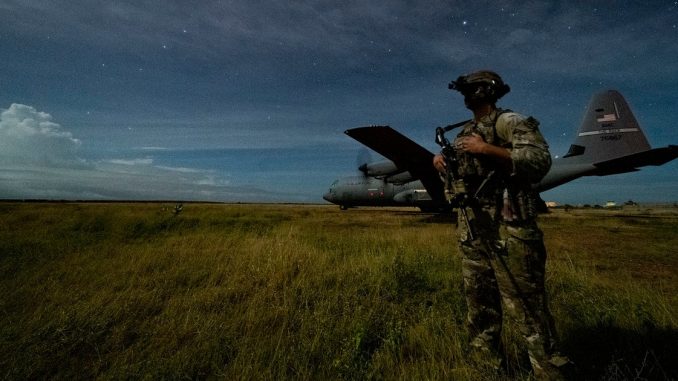
When President Donald Trump ordered roughly 700 U.S. troops to withdraw from Somalia late last year, it decreased the American footprint there, but not the mission to help that country’s military fight back against al-Shabab, al-Qaida’s largest affiliate.
Three months after the completed drawdown, senior U.S. Africa Command leaders say that they are essentially doing the same work, but “commuting” from Europe and other East African countries to get it done.
“There’s no denying that the repositioning of forces out of Somalia has introduced new layers of complexity and risk,” Army. Gen. Stephen Townsend, AFRICOM’s boss, told the Senate Armed Services Committee on Thursday. “… our understanding of what’s happening in Somalia is less now than it was when we were there on the ground, physically located with our partners. So we’re working to make this new mode of operation work.”
Al-Shabab continues to carry out attacks around Somalia, including in capital city Mogadishu.
And “they do desire to do harm to the U.S. homeland,” Marine Command Sgt. Maj. Richard Thresher, AFRICOM’s senior enlisted leader, told Military Times on Friday.
Containing them is AFRICOM’s top priority, and that’s accomplished by sending special operations forces to train, advise and assist local troops in the group’s Somalia home base.
With U.S. troops no longer rotating into the country, that means remote meetings over teleconferencing, in addition to periodic trips to the country for more hands-on engagements.
“It makes it more difficult,” Townsend said. “It doesn’t make it impossible.”
On Friday, the command was in the midst of its fourth in-person trip to Somalia, Thresher said.
Based in Djibouti and Kenya, he said, the “commuters” are still remotely training, advising and assisting Somali forces around in-person training, while senior leadership flies in from AFRICOM’s Stuttgart, Germany, headquarters to inspect and meet with leaders.
“It is important to point out the tyranny of distance,” Thresher said. “…any time you’re commuting to work, it’s harder. So you have to bring more equipment with you.”
It wouldn’t be fair to say AFRICOM has lost any momentum because of the drawdown, officials said, but some of the important details, are more complicated when you’re not co-located.
/cloudfront-us-east-1.images.arcpublishing.com/mco/WYNFJGBMPZERVMIHAQXNYGJVR4.jpg)
“…you know, so when you’re shoulder to shoulder, that intel component is easier to understand, than when you’re commuting to a place,” Air Force Col. Chris Karns, AFRICOM’s spokesman, told Military Times.
To make up for that time, distance and lower visibility, the planning process gets more involved, including the surveillance and reconnaissance before airstrikes, which have not slowed down since the withdrawal.
“So I mean, it’s obvious ― you can figure out that it does reduce a little bit of your nimbleness,” Thresher said. “So you just rely better on indications and warnings, and use those types of things to best plan for what types of patrols or whatever you’re going to do. You’ve got to plan better, and earlier, and more often. And a lot of that’s dependent upon intelligence.”
Leadership has been hesitant to say outright that the situation needs changing. Both Townsend and Thresher pointed to Defense Secretary Lloyd Austin’s global posture review, due to wrap up this summer, and the opportunity to voice concerns.
“[We] will be presenting options to the secretary of defense on the way ahead,” Townsend said Thursday. “And, of course, I ―I don’t want to get ahead of my civilian leadership.”


Be the first to comment